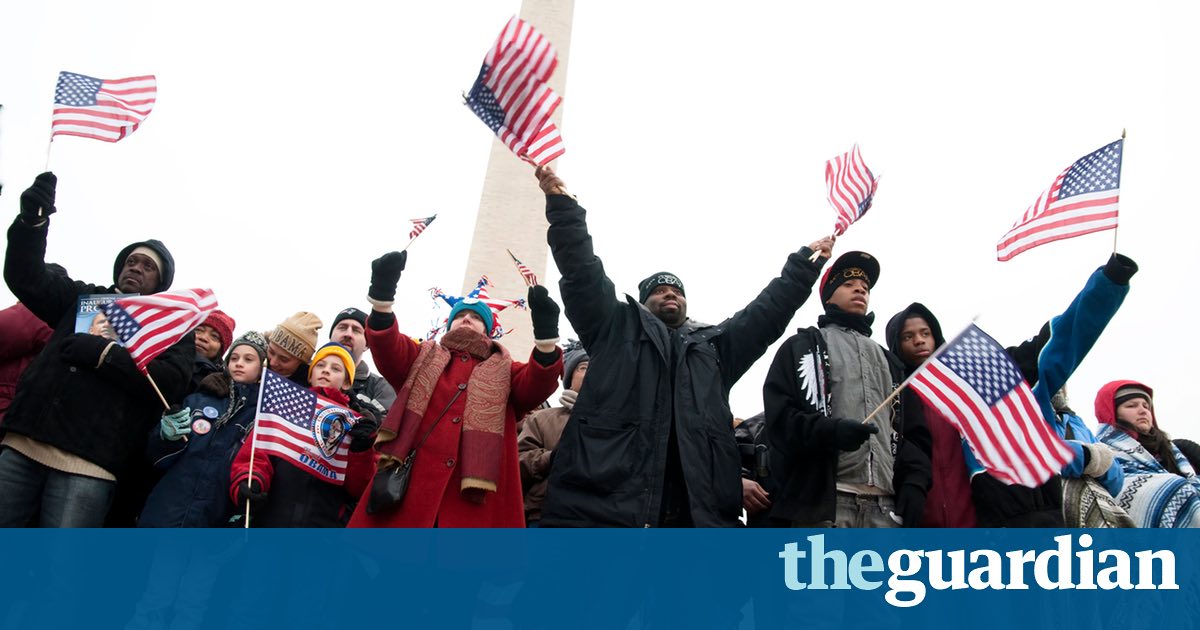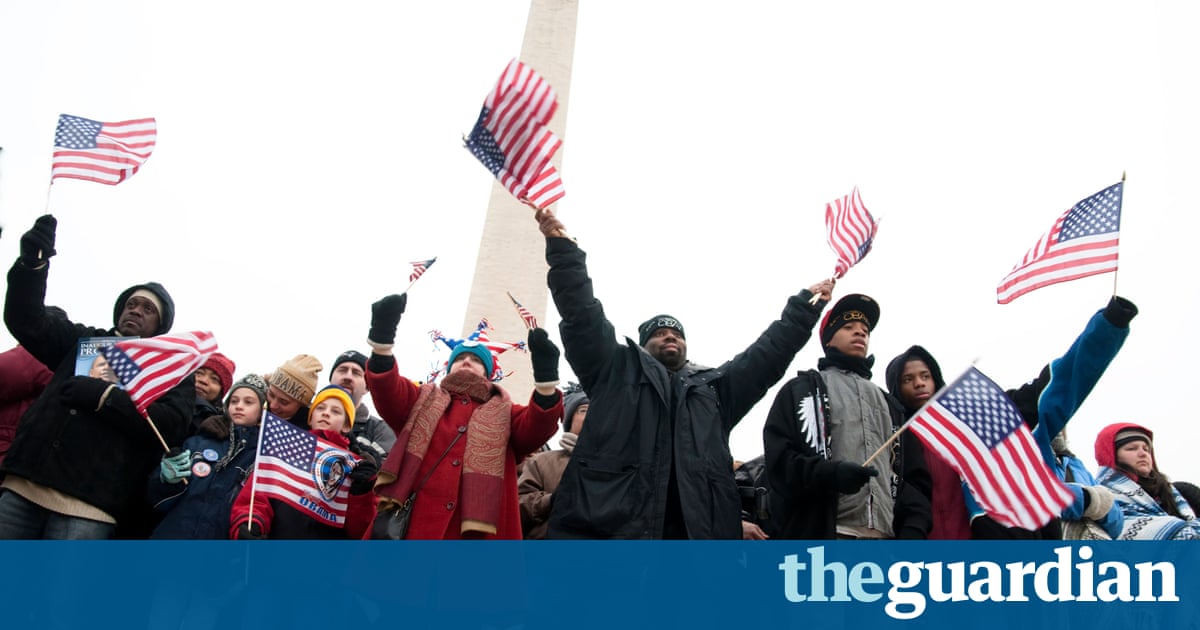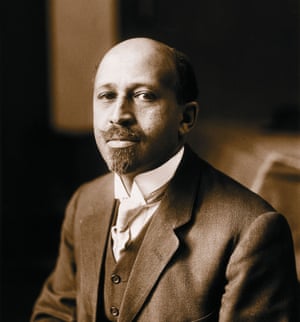The Divided States: Trump’s inauguration and how democracy has failed | Pankaj Mishra

Donald Trump and his demonisation of minorities are not the exception in US history they are its logical conclusion. Pankaj Mishra examines the dream of the multiracial democracy, and Americas failure to realise it

Never in human history have so many diverse peoples lived together as in our time. Nor has the appeal of democracy ever been so widespread. The promise of equal rights and citizenship held out by modern society has been universally embraced, especially keenly by people long deprived of them. But, as Donald Trump, the favoured candidate of white supremacists, becomes president of the United States, the quintessential multicultural democracy, the long arc of the moral universe, as Martin Luther King called it, does not seem to be bending to justice.
Trump came into political prominence accusing the first black president of the United States of being foreign born; he rose to supreme power stigmatising Mexicans as rapists and Muslims as terrorists. His election victory was engineered by Steve Bannon, the executive chairman of Breitbart News, an online site notorious for its antisemitism, racism, misogyny and xenophobia. The joint arrival of Trump and Bannon in the White House, where they will enjoy nearly unlimited power, completes a comprehensive recent rout of the founding principle of the modern world: that, as the revolutionary phrases of 1776 had it, all men are created equal, entitled to the unalienable rights of life, liberty, and the pursuit of happiness.
Hatemongering against immigrants, minorities and various designated others has gone mainstream universally even in Germany, whose post-Nazi politics and culture were founded on the precept Never Again. An era of separatism, in which people barricade themselves in fortresses, united only with those who look and speak like them, has unexpectedly dawned. Back in 1993, the suggestion from Gianfranco Miglio, the intellectual theorist of Italys Northern League, that civilised Europe should deploy the atavistic nationalism of barbarian Europe (the east) as a frontier guard to block the Muslim invasion would have seemed preposterous. Today, the demagogues ruling Hungary and Poland claim to be the sentinels of a Christian Europe threatened by Muslim refugees and immigrants. Brexiters in the UK, imitating Tory tactics in Londons mayoral election, conjured up minatory visions of foreigners. A near-majority in the Jewish population of Israel wants the countrys Arab citizens to be expelled. Geert Wilders demand for mass deportations of Muslims may help him become prime minister of the Netherlands.
White nationalists in both Europe and America revere Vladimir Putin, who openly rails against so-called tolerance, and who inaugurated his regime and his quest for an organic Russian community with a vicious assault on Chechnya. In India, the worlds largest democracy, Hindu supremacism feeds off a relentless ostracising of minorities. The Turkish president Recep Tayyip Erdoan is trying to consolidate his support by encouraging attacks on Turkeys Kurdish citizens. Politicians in Sri Lanka have flourished at the expense of a Tamil minority, which, traumatised by a massacre in 2009, is now routinely victimised by discriminatory policies. Rwandas president, Paul Kagame, continues to draw political dividends from his persecution of Hutus. Assaults on religious and ethnic minorities enjoy broad sanction in Pakistan, Bangladesh, Indonesia, Malaysia and Thailand. The much-celebrated advent of democracy in Myanmar now seems to have been a signal for ethnic cleansing.
It was not so long ago that free trade and the magic of the market, in the exuberant phrase of the Financial Times commentator Martin Wolf, seemed to be bringing about the benign homogenisation of all human societies. As Louis Vuitton opened in Borneo and the Chinese turned into one of the biggest consumers of French wines, it appeared only a matter of time before free trade and consumer capitalism were followed by the rule of law, the enhanced use of critical reason, the expansion of individual freedom and the tolerance of diversity. Instead, the world at large from the US to Indonesia is undergoing a militant tribalisation. The new demagogues combine xenophobia with progressivist rhetoric about decent housing, efficient healthcare systems and better schools. Insisting on linguistic, religious, ethnic, and racial differences, they dont just threaten free trade, or the globalist dream of achieving cosmopolitan unity through intensified commerce and digital communications. They seem to be deforming nothing less than the secular and egalitarian ideals of modernity.
The deformations are particularly ominous in the US, a primarily immigrant country. The abolition of slavery, and an influx of immigrant labour from China, Japan, Ireland, Russia and Germany in the 19th century, turned the US into what Walt Whitman called a teeming nation of nations. American politicians and publicists of varying political commitments have since insisted that they are engaged in building a multiracial city upon a hill, a country that, dedicated to equal rights and potential for all its citizens, would be an example to all people on earth. Their claims to a quasi-providential mission have been strengthened by the fact that many among the huddled masses around the world, as well as new immigrants in the country, have eagerly wished to be American.
It is also true that the American ideal of the melting pot appears to have little scope for an organic community of the kind Putin, or Marine Le Pen and Nigel Farage invoke. Yet the treacherous fantasy of a homogenised citizenry has repeatedly erupted in the US; and this time it threatens democracy everywhere in the world.
The emphasis today on cultural identity and difference is unquestionably a response to the painful and bewildering experience of globalisation. Those vowing to take back control from unaccountable technocracies and opaque financial markets hope to reconstruct a political space by forging afresh the sovereign people a political project that is most quickly achieved by identifying the enemies of the people. Ethnic and religious minorities have always been scapegoats for the suffering inflicted by impersonal markets the word antisemitism was coined in the late 1870s during a severe economic downturn when demagogues channelled mass rage at Jewish populations.
But this explanation has an even more disturbing aspect, which we should not flinch from. The identification and demonisation of racial and ethnic others is far from being an aberration in liberal democracy. Nor is it merely a pathology unleashed by economic shocks. Rather, such injustices are central to democracy, as conceived and practised for much of modern history, and they are inseparable from liberal ideals of reason and progress.
***
The African American thinker WEB Du Bois had diagnosed the built-in contradictions of democracy and liberalism as early as the 19th century. In his view slavery had violently coerced Africans into a world economic system, and then global capitalism, binding together more people of different social and historical backgrounds, had piled new economic inequalities on to older racial prejudices and discrimination. Both forms of degradation were vital to the making of prosperous democracies in the Atlantic west; and they made it arduous, if not impossible, for the degraded to realise the modern promise of freedom and equality. The problem of the 20th century, Du Bois predicted in 1903, would be the problem of the colour-line.
Du Bois wrote as Jim Crow segregation in the industrialising US cancelled gains from the abolition of slavery and as white men scrambling for colonies and empires in Asia and Africa built new racial hierarchies. He would later conclude that the end of slavery in the American south had actually enabled industrial capitalists in the north to expand globally, and, together with their white European counterparts, help entrench a new industrial slavery of black and brown and yellow workers in Africa and Asia. Du Bois feared that the colour of the skin and texture of the hair would become the basis of denying the opportunities and privileges of modern civilisation to many.

The 20th century seemed to both prove and disprove Du Boiss anxieties about the exclusionary nature of modern politics and economy. Antisemitism, simmering through successive political and economic crises in Europe, exploded in the worst crime in human history. Ruthless imperialists in Asia and Africa presided over wars and famines that killed countless millions. Yet decolonisation led to the creation of independent nation states with egalitarian ideals, followed belatedly by the end of apartheid in South Africa. Some of these globalised economies have appeared in recent years to outpace those of their former western overlords. The problem of the colour line was tackled by the civil rights movement and then seemingly partly solved by a series of successful black politicians, athletes, pop stars, artists and intellectuals; it seemed to have been finally cracked in 2008 when the son of a Kenyan Muslim was elected president of the United States.
But hopes for a post-racial democracy were always extravagant. Obamas own sanguine attempt at colour-blindness was mocked by, among other things, widely circulating photos that depicted him as a monkey. Ethnic-racial separation has remained starkly evident in the killing or cruel treatment of minorities, housing discrimination against them in major cities and the destitute conditions of many African American and Native American communities. Moreover, reactionary tribalism, or the political urge to create a society of unequal men and women, has never lacked potent sponsors in the US.
By the 1970s rising extreme right groups, the Minutemen, the American Nazi party, the Aryan Nations and a revived Ku Klux Klan were leading a white backlash against the civil rights and feminist movements. The Turner Diaries a cult 1978 novel by William Pierce, founder of the white nationalist organisation National Alliance incandescently evokes an America ruled by swarthy Jewboys and overrun by African Americans, who have been freed by politically correct legislation to deprive white men of their guns and rape white women.
The destabilisation of the old racial order and gender roles spawned a netherworld of political rage, manifest in recent years in the rise of white militias, attacks on abortion clinics and random shootings. Timothy McVeighs murder of 168 Americans in Oklahoma City in 1995 now seems an early salvo in what the isolationist conservative Patrick J Buchanan called a war for the soul of America. McVeigh was known to rail against feminism and the political correctness that, in his view, pampered African Americans. Writing about the destruction of the white middle class and the American dream in general in a small-town newspaper in 1992, McVeigh, then a young veteran of the Gulf war, chillingly anticipated our age of anger.
Racism on the rise? You had better believe it. Is this Americas frustrations venting themselves? Is it a valid frustration? Who is to blame for the mess? At a point when the world has seen communism falter as an imperfect system to manage people, democracy seems to be headed down the same road. No one is seeing the big picture.
The big picture in 1992 for many, Democratic as well as Republican, was the end of history and the worldwide triumph of American-style democracy and capitalism. In this supposedly post-political phase, when national politics seemed merely an adjunct to transnational markets and information networks, it was left to political outliers such as Buchanan to demand social and economic justice for white American workers. Calling for economic protectionism, an end to immigration and toughness with minorities, Buchanan anticipated the xenophobic nationalism of Trump.
***
It was Americas founders, however, who first betrayed the acute tensions in the modern ideologies of individual emancipation. They indeed committed themselves, as Obama asserted in his farewell speech in Chicago this week, to a radical political experiment with their belief in the liberty and equality of every person; but they formulated their self-evident truths in the same Virginian swamp where slaves languished. As it turned out, a mixed and extremely unequal population couldnt but exacerbate the challenges of realising the universal community of freedom in the US not to mention in the rest of the world that immigrants, free traders and imperialists knit closely together.
European settlers, traders and colonists from the 17th century onwards had represented many of the non-European peoples they managed to subdue as uncivilised and inferior, if not candidates for elimination. Racial categories became steadily indispensable to the settlers and colonials of the New World. By the late 18th century, however, people who had been strong-armed into the modern world economy posed a serious moral and political dilemma to those affirming universal human equality and freedom. One way to escape this was to distinguish between those who are properly human and those who arent; those who deserve freedom and those who dont. Thus, a priori distinctions between human and non-human, reason and unreason, civilisation and barbarism underpinned the modern ideals of freedom and democracy from the time they were formulated. John Stuart Mill was upholding these older hierarchies when he, justifying British rule over India, wrote in 1859 that despotism is a legitimate mode of government in dealing with barbarians.
Read more: https://www.theguardian.com/books/2017/jan/13/divided-states-trump-america-failed-democracy